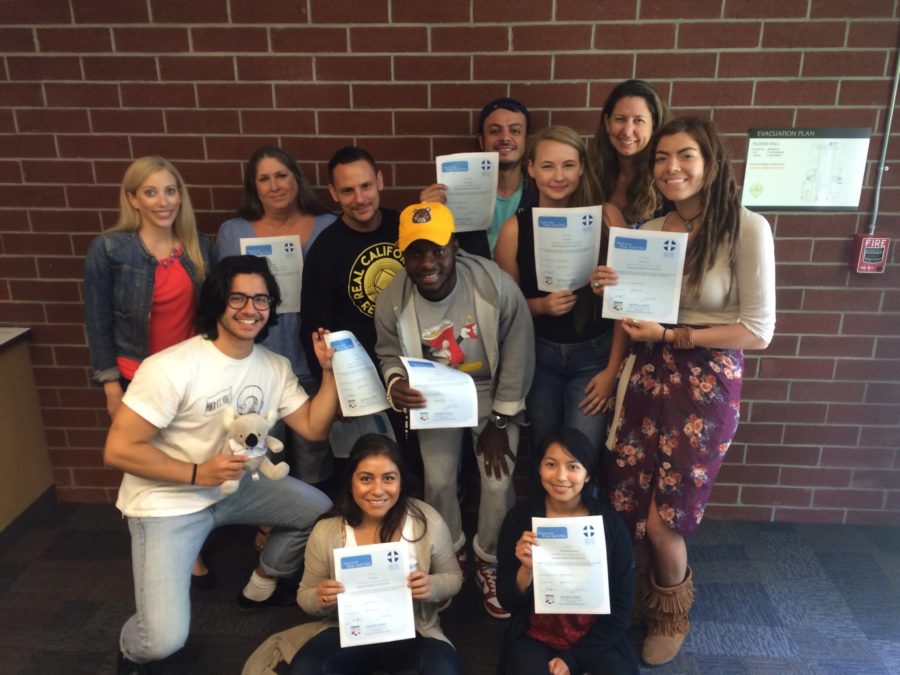Santa Rosa Junior College Student Health Services PEERS Coalition went through eight hours of training to get a certificate in mental health first aid Sept. 19 in order to better support students who face mental illness.
National Alliance on Mental Health data states there’s a high prevalence of mental health disorders on college campuses and more than 25 percent of college students have been diagnosed or treated.
Mental Health First Aid is a public education program created to support community members in understanding mental illnesses, and to prevent and perform intervention in case of crisis.
The mnemonic ALGEE simplifies the strategies covered. A stands for assess risk of suicide and self-harm, or harm of others. L is listening without judgment. G is to give reassurance and information. E is for encouraging appropriate professional help. E stands for encouraging self-help and strategies.
According to PEERS member and student aide advisor Heather Mullin, 22, the course has helped with developing empathy for students suffering distress related to mental health.
“I have a different view of the person sitting on the steps of the library crying, and how I would internally battle if I should help,” Mullin said. “Mental Health First Aid gave me the tools to know that it’s entirely within my power to be there for someone suffering. Bottom line is I’m capable to support that person.”
PEERS member Armand Beikzadeh, 21, believes the stigma surrounding mental health issues can make it more difficult for students to help in a time of crisis. People tend to empathize and act faster when it comes to physical injuries, or someone suffering a heart attack according to Beikzadeh.
“In this society, if someone was having a mental health crisis, the reaction would be a little different. This training is for de-stigmatizing,” Beikzadeh said. “We’re not professionals, like psychologists, but we can refer them to resources. It’s like first aid. No one would open their heart and perform surgery, but you can make sure they’re OK.”
Beikzadeh believes the main goal of helping out a person in a crisis is to reassure there is hope, and the moments of distress can be turned around.
“We learned how to be a bridge between the crisis and the center that the person can actually get help,” Mullin said.
The training focuses on supporting individuals who face depression, anxiety disorders, panic attacks, substance and schizophrenia. The hours are divided into two days, and there’s a balance between classroom and workshop activities.
During a simulation of schizophrenia symptoms, PEERS members were asked to carry a conversation while a third party whispered in the air. Mullin described the upsetting experience of trying to answer simple questions, and getting disrupted by whispers.
“I felt trapped and deeply empathetic,” Mullin said.
Jeane Erlenborn, Student Health Services health promotion specialist, facilitated the training with the support of Sonoma County Behavioral Health.
“You’re more likely to run into someone who’s struggling with a mental health issue than having a heart attack,” Erlenborn said. “If someone is having a mental health crisis people don’t know how to react.”
Erlenborn points out the course is not only about a crisis. “It’s also about being able to recognize when someone’s developing a mental illness,” she said.
The opportunity of training alongside people from various backgrounds, such as police officers and professors, empowered and inspired Erlenborn.
“It felt like a concrete way to make a difference on this campus,” Erlenborn said. “If we have more students and faculty and staff trained in mental health first aid we can see a change on campus on how much people know about resources, and how to support each other.”
In addition to the training, Erlenborn also teaches course CHW 155 Peer to Peer Mental Health Promotion which trains students interested in developing many of the same skills.
PEERS members encourage students to be proactive when confronted with the suffering of a fellow student. It’s important to ensure that person’s safety, as well as your own, and to inform a PEERS member, or to guide the person to Student Health Center Services in Plover Hall. If the person is in danger of harming themself or others, quickly contact campus police at (707) 527-1000.
PEERS recommends attending the fall Wellness Fair, an event that will explore aspects of leading a healthy and balanced lifestyle, including many topics in mental health. The Wellness Fair will be held 5-8 p.m. on Oct. 27 in the main quad.


